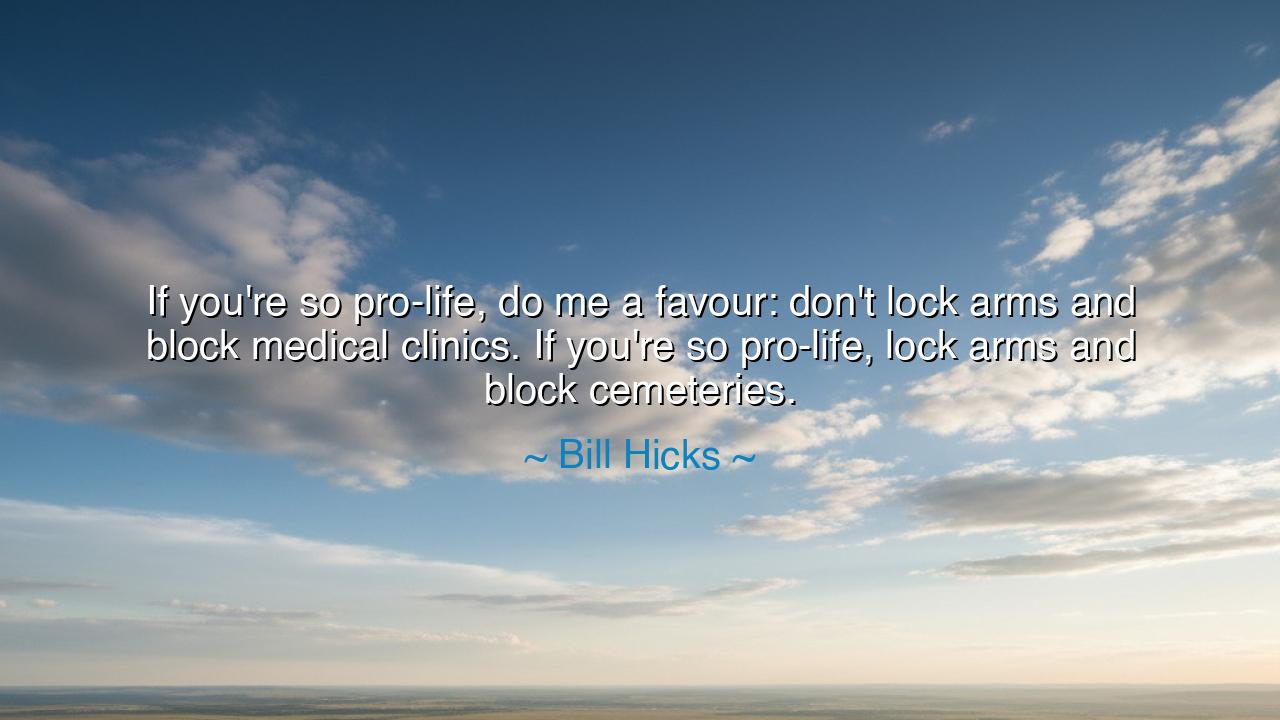
If you're so pro-life, do me a favour: don't lock arms and block
If you're so pro-life, do me a favour: don't lock arms and block medical clinics. If you're so pro-life, lock arms and block cemeteries.






"If you're so pro-life, do me a favour: don't lock arms and block medical clinics. If you're so pro-life, lock arms and block cemeteries." These words from Bill Hicks ring with a stark irony and a deep truth that transcends the politics of the moment. Hicks, in his typically provocative style, challenges us to look beyond the rhetoric of any cause and to ask ourselves whether our actions align with the values we claim to support. His words ask us to confront the hypocrisy that often lies behind ideological stances—especially those that claim to be about life—and to question whether we truly respect and value life in all its forms, from birth to death.
In the ancient world, the concept of life and death was not one easily compartmentalized into neat, opposing sides. The Greeks understood life as a complex, ever-shifting force, bound up with both the joys and the sufferings of existence. Socrates, on trial for his life, famously embraced death, understanding that the truth and the pursuit of wisdom were worth more than mere survival. He chose to face death rather than abandon his principles. In his defense, Socrates argued that one must always live with integrity and purpose, regardless of whether life or death follows. His was a worldview that honored life—not in abstract terms, but in how one lived it, how one cared for others, and how one treated the inevitable end that awaited all.
The ancient Romans also engaged in deeply philosophical debates about life, especially in the context of war, sacrifice, and honor. Figures like Cicero and Seneca considered the meaning of life from a perspective that included both the respect for living and the acknowledgment of death as part of the natural order. They believed that life could not be separated from death, and that both required the same level of respect. In their view, to fight for life while disregarding the dignity of death was an empty and self-serving pursuit. Thus, they called for a holistic respect for life, one that embraced both its beginnings and its ends. The lessons of the ancients, though rooted in the distant past, still hold resonance today as we confront the same questions of respect, dignity, and the value of life.
In more modern times, Hicks' words reflect the same kind of irony that arises when people profess to be pro-life yet fail to address the broader complexities of life itself. He points out the contradiction of those who claim to protect life but act in ways that seem more about control and judgment than actual care for the living. He asks us to consider whether we can truly honor life if we do not also address the suffering that people endure in the world—whether that suffering occurs in a medical clinic, a poverty-stricken home, or in the final moments of life in a cemetery. The message is clear: if we truly respect life, we must fight not just for birth but for dignity in every stage of existence.
The historical example of Mahatma Gandhi offers us a powerful illustration of the difference between words and actions in the service of life. Gandhi, a man of deep conviction, dedicated his life to non-violence and the respect of every human being. He did not just speak about life; he lived it in its most pure form, fighting for the rights of all people, regardless of their station, race, or religion. Gandhi believed that true respect for life meant acting in ways that preserved dignity for everyone. His profound respect for life extended far beyond the beginning of life—it encompassed the living and the dying, seeking peace and justice in all.
Bill Hicks’ quote calls for a similar reflection in our own time. If we are to truly honor life, we must live with integrity and consistency in our actions. To claim to be pro-life while overlooking the broader realities of human suffering or failing to address the systemic issues that diminish the quality of life for many is to be blind to the true meaning of the term. It is not enough to focus only on the beginning of life; we must honor and care for life in all its forms, from its birth to its death. This means being present in moments of suffering, not just in moments of joy, and offering compassion to those in need of care and dignity, whether in a hospital bed or at the end of life.
The lesson here is that to truly respect life, we must act with a holistic view—one that does not separate the beginning from the end but sees the entire journey of life as sacred and deserving of our care. We must recognize that true compassion extends beyond political or ideological positions; it demands that we actively work for a world where every life is valued, where suffering is alleviated, and where dignity is afforded to all people, regardless of their circumstances. In this way, we honor life in all its stages, embracing its complexity, its joys, and its sorrows, and recognizing that true respect for life requires action at every moment.






AAdministratorAdministrator
Welcome, honored guests. Please leave a comment, we will respond soon